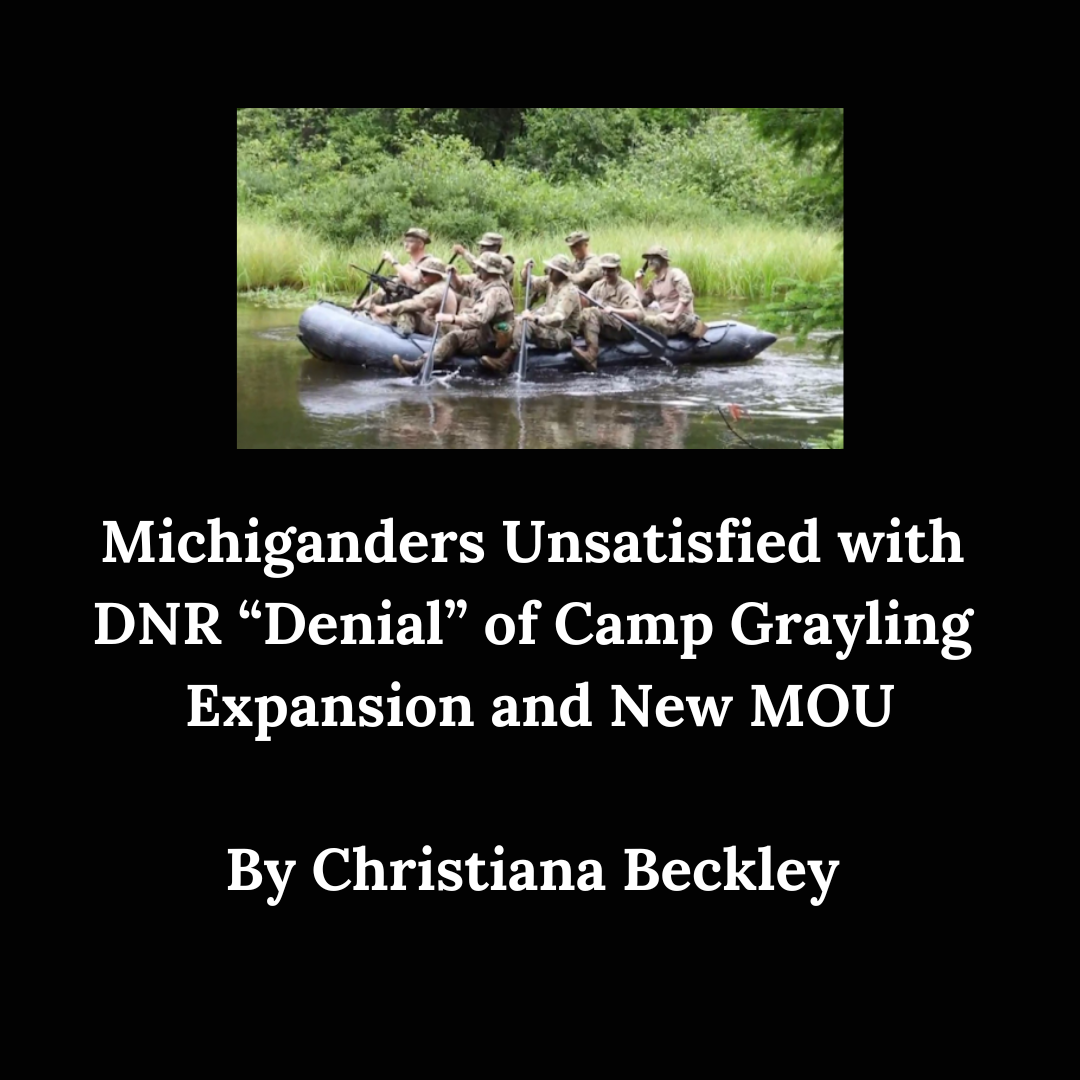Photo credits to Kenny Karpov
Camp Grayling is a Michigan National Guard (MNG) training center and part of the National All-Domain Warfighting Center located in Crawford, Kalkaska, and Otsego Counties. The Department of Military and Veterans Affairs has leased 147,000 acres of land from the Michigan Department of National Resources (DNR) since 1935, making it the largest National Guard training base in the United States. In January 2022, Camp Grayling leaders asked that the DNR consider a request to lease up to 162,000 acres of additional state forest land on a 20-year lease, more than doubling the size of the center. Citing the consideration of public comments and meetings with Michigan Tribal authorities, the Michigan DNR declined the proposal as written on April 28th, 2023.
The denial elicited a short sigh of relief from concerned residents of the rural area and climate activists alike – short lived because although Camp Grayling will not be doubling in size, the MNG will still have access to up to 52,000 additional acres of state forest land for “short-term, low-impact training activities” through a new Memorandum of Understanding. To put things in perspective – San Francisco, California spans just over 30,000 acres. This is still a huge concession.
I spent the last three months speaking with Michiganders from all over the state, and it became clear that despite political, religious, and cultural divides; on this issue they agree. Any expansion, even a smaller one that requires short term permits every year, poses threats to wildlife, the water, access to hunting, fishing and recreational areas, and it is almost unanimously unwelcome. Many feel that this compromise was meant to placate or silence the opposition, but concerned citizens are not backing down.
Mural in Downtown Grayling

On an unseasonably warm and sunny day in mid-March, photographer Kenny Karpov and I made the three-hour drive north from Detroit to the historic mill town of Grayling, Michigan. The city of ~1,900 residents resembles many small Michigan towns. Most businesses are still closed for the season, awaiting the influx of summer tourists who come to recreate in the area. The proximity to and pride for the rivers is apparent. Colorful signs advertise canoe and kayak rentals and fishing outfitters. River-themed murals populate old brick walls. With the National Forest to the east, Old-growth Pine State Forest to the north, and Lake Margrethe to the south, there’s not much left to want for midwesterners looking to enjoy the great outdoors.
However, the town’s environmental history is far from idyllic. In the late 1800s and early 1900’s lumber baron, Rasmus Hanson ran a massive lumber operation on 40 acres of land near the mouths of the Au Sable and Manistee Rivers. The majority of the old-growth forest was razed and logging practices destroyed the breeding grounds of the Arctic Grayling – the freshwater fish for which the town was eventually named. The species is now extinct in Michigan.
In 1916 Rasmus Hanson left another legacy to the town of Grayling when he donated 13,862 acres of cut-over land to the State of Michigan for military training and preservation.
Today, Camp Grayling spans roughly the size of Chicago. It boasts large artillery and tank ranges, airspace with 70 helicopter pads, and a newly constructed Forward Operating Base, which is essentially a fake city complete with mock hospitals, libraries, and schools used for training law enforcement and military in urban intervention. There are also barracks, maneuvering courses, and an explosive testing field. A high security juvenile detention center also sits inside the camp.
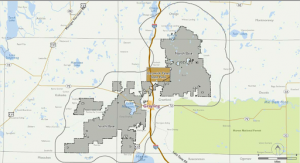 Current Camp Grayling Area
Current Camp Grayling Area
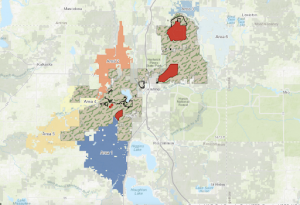
Proposed Expansion (Areas 1-6)
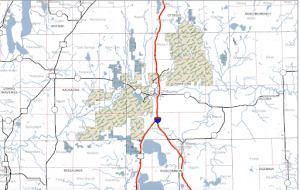 Land available to lease under MOU in dark blue.
Land available to lease under MOU in dark blue.
Though the town sees less tourist traffic in the off-season, soldiers in camouflage fatigues lunching at the local diner and passing through in armored vehicles are a common presence year-round. The main entrance to the facility sits just a few miles off the main downtown corridor of Michigan Ave. on the aptly named Military Road. Locals I spoke to were quick to assure me that they support their servicemen and women, and appreciate their business in town. Their relationship with the camp and its operations, however, has been a storied and complicated one.
Our first stop in Grayling was the home of Ann Benson. Her long driveway branches right off Military Road, across the street from the “Hanson Military Reservation” sign, aka Camp Grayling. Ann’s spacious home sits on the shore of Lake Margarethe. It was a vacation home in her family for 45 years before she moved in permanently in 2019. Ann got in touch with me through a Facebook group called Camp Grayling Expansion. The group of over 2,000 members is made up almost entirely of regular citizens that live and work in the Camp Grayling expansion area, all of whom are opposed to an expansion of any kind. “Not One More Acre” is the group’s adopted slogan.
“There’s a huge grassroots effort,” she said. “All of the public county commissions and all of the environmental groups are just totally against this.” (Ann said this in March before the MOU, but sentiments have not changed amongst local citizens and governments.)

Benson in her kitchen March 2023
Ann’s main reason for opposition is a very personal one. For years, her well water has been contaminated with polyfluoroalkyl substances – also known as PFAS or PFOS. The contamination is often attributed to being a result of stormwater drainage from Camp Grayling into Lake Margarethe. The base uses the substance in chemical fire suppressants. The presence of these carcinogenic chemicals in local wells and waterways was first discovered in 2016, though Camp Grayling continues to use the chemicals on a regular basis. Despite years of violation notices from the Department of Environment, Great Lakes, and Energy – they have also done very little to mitigate the issue. Ann has her water tested every year, and the levels of both PFAS and PFOS in her drinking water are staggeringly high: Up to 18 parts per million, 450 times the level considered unsafe by the EPA. (Though the EPA has not established a legal standard for this specific contaminant, they do consider water unsafe to drink at .04 parts per million.) The local health department installed a three-part water filtration system for Ann that runs to one small faucet which she uses to drink, brush her teeth, and wash her dishes and hands. Ann says all of her neighbors have filters too.

Ann’s “Safe” Water Faucet

Three-part water filtration
“They’ve already shown they’re not good stewards of the land, and now they want more. Who would be responsible for monitoring that? It hurts me that [Democratic Senator Gary] Peters and [Governor Gretchen] Whitmer are not doing something about it, cause that party is usually more environmental.”

Michigan EGLE released this statement in January 2023
“The Michigan Department of Environment, Great Lakes, and Energy (EGLE) has significant concerns about the Army National Guard’s response to PFAS contamination at the Camp Grayling facility, as expressed by EGLE’s Gaylord District office in a December compliance communication to the Guard. Michigan EGLE has no regulatory authority over the proposed expansion and will not make a formal agency recommendation on that matter.”
I spoke with Marie Powell Robertson who lives 10 miles north of Grayling in North Frederic Township on the phone. She had concerns about the potential overreach of the camp without knowing why it was needed or what it would mean for those who live and work in the area. “When we found out we were alarmed to say the least. Especially to find out a gun-firing point is proposed within a mile of our home.” She explained. “We were aware of the guard’s presence when we moved here and we love to have the military personnel in town; however, their presence has been much more palpable in recent years than it was before. They fly helicopters 500 feet over our house, they’re using bigger equipment and summertime camp traffic has increased.” She said she feels the citizens’ concerns have fallen on deaf ears. “I’m really concerned about the deflection by the Governor. There has been zero transparency with the people who will have to live amongst whatever they’re planning. I’ve been to several township meetings. There was one with representatives from Camp Grayling where citizens were allowed a 3-minute slot to ask questions. Colonel Myers and Tom Barnes gave very general, vague answers. They seemed almost pre-planned. Basically, they said, ‘It won’t really affect anything, you’ll see soldiers in the forest – when you see them, wave!’”
In February I asked what she would do if the expansion was approved, and she said her family had considered moving. I followed up after the new decision and she said, “The announcement changes nothing for me. The area 1 mile from my house is in the MOU.”
Area residents maintain that the language of “denial” by the DNR is misleading. On May 10th the Beaver Creek Township Board (Kalkaska County) approved a resolution to Oppose Camp Grayling use of State Lands by Permit. The resolution states, “The guard is still dangerously vague about planned activities they will be conducting and the potential for adverse efforts and the lands wetlands and wildlife, and there is no provision in the MOU for an environmental impact statement or even an environmental assessment. The Michigan National Guard has yet to demonstrate that they cannot conduct these military uses on their existing 230 Square miles.”
The Camp has not always kept their promises around environmental preservation. Multiple locals turned my attention to this photos from August, 2022, in which soldiers can be seen rowing a raft down the Manistee River during a training exercise.
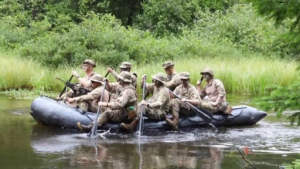
Soldiers Rafting down the Manistee River during a Training Exercise (Photo taken by Bear Lake Township resident Gary Vetter. Source: interlochenpublicradio.org.)
Under their current lease, training exercises are meant to maintain a 1,500 ft buffer from all rivers and waterways. Under the new MOU, the buffer has been increased to 3,000 ft. The Commander of Camp Grayling, Colonel Scott Myers had a befuddled response, claiming that the exercise was unapproved. “We had a unit who is getting ready to go overseas in harm’s way in about 60 days. That organization made an uncoordinated or unapproved decision to do some additional training.” There were no repercussions for this breach of the agreement. With the recent Supreme Court decision to narrow the scope of the Clean Water Act, removing protection for wetlands with no “continuous surface connection” this buffer may not do much to keep groundwater safe even if they do follow the rules.

Soldiers Dining at the Grayling Restaurant
Earlier in the year, I spent some time with environmental activists who were traveling around the region and spreading information about Camp Grayling. Despite significant differences in age, political (or lack thereof) affiliation and fashion – they shared many sentiments, although perhaps for different reasons.
I asked Osprey* of Ypsilanti, MI where she stands on the expansion and why “I’m absolutely against it. The additional vehicles and other infrastructure will decimate the local ecosystems, which in turn will impact the ecosystems across the rest of Michigan. And the runoff from PFAS, PFOS, and other chemicals will poison the water supply of the Great Lakes and other hydrological bodies.” Unlike many of the locals, her opposition was also rooted in a broader critique of the U.S. armed forces. “I am against anything that will expand American military power. We have already occupied countless countries and territories and have committed– and are committing– numerous war crimes. The US Military has more funding than Public Education and the Arts combined.”
I also spoke with Jaguar, an indigenous Two-Spirit born and raised in so-called Michigan. It’s worthy of note that this is a situation where descendants of colonizers face similar injustices that Native Americans have faced for centuries. Jaguar had this to say: “This issue directly affects all Native people. In our culture, the earth and all things are our family. How would you feel if somebody was poisoning your mother? That’s exactly what this base already does.” I also asked them about potential broken treaties by Camp Grayling. “I don’t personally care about which “promises” the state is breaking here. Those treaties were always a bad-faith document produced by the colonizers, for the colonizers; Native people have never made decisions in the way any of these “treaties” were signed. The state is a genocidal occupier who must be resisted at all turns. It is time for black and brown people to get what we are due.”

Hartwick Pines Old Growth Forest (photo by Christiana Beckley)
There is a lot to take in and consider about Camp Grayling and the looming prospect of the acquisition of so much state forest land by the US Military. All Michiganders stand to deal with consequences, and so do the forests, rivers, and wildlife that have made their homes there for millenia. Some are driven by their love for hunting, fishing, and rural living, others by fear for their health and wellbeing, and others by personal values of anti-imperialism, but no matter the reason – the people have spoken and the fight against any expansion continues. Will the legacy of extinction as experienced by the Arctic Grayling continue, or might this effort encourage a shift towards better advocacy for and stewardship of the precious resources in Michigan?
Christiana Beckley (they/them) is an independent filmmaker, artist, and writer based in Detroit, MI. They have done documentary work for Kresge Arts, Pure Michigan, and the Center for Artistic Activism, and their films have been awarded at festivals in the US, Canada, France, and Colombia. More of their writing can be found at runner magazine Detroit and in Cypher: Poetry Anthology. They also organize around environmental, racial, and social justice issues.
Kenny Karpov (he/him) is a visual storyteller and documentary photographer. He has traveled the world for the last six years documenting the lives of people at various stages of their migration from war-torn countries in the Middle East and Africa to Europe. He is the author of two books written about his time in the Mediterranean Sea. His first, a nonfiction book entitled Despite It All We Never Learn, is a collection of refugee testimonials recorded and written aboard rescue vessels over seventeen missions from 2015 – 2020. His second book, A Small Corner of Hell, is a collection of photographs and written stories.
Karpov is a visual storyteller and documentary photographer. He has traveled the world for the last five years documenting the lives of people at various stages of their migration from war-torn countries in the Middle East and Africa to Europe. His latest project is a nonfiction book entitled Despite It All We Never Learn a collection of refugee testimonials that were recorded and written aboard various rescue vessels in the Mediterranean Sea over the course of seventeen missions from 2015 – 2019. Prior to the nonprofit work, Karpov worked for the New York Times, BBC News and NPR.
Karpov is a visual storyteller and documentary photographer. He has traveled the world for the last five years documenting the lives of people at various stages of their migration from war-torn countries in the Middle East and Africa to Europe. His latest project is a nonfiction book entitled Despite It All We Never Learn a collection of refugee testimonials that were recorded and written aboard various rescue vessels in the Mediterranean Sea over the course of seventeen missions from 2015 – 2019. Prior to the nonprofit work, Karpov worked for the New York Times, BBC News, and NPR. Karpov is a visual storyteller and documentary photographer. He has traveled the world for the last five years documenting the lives of people at various stages of th

